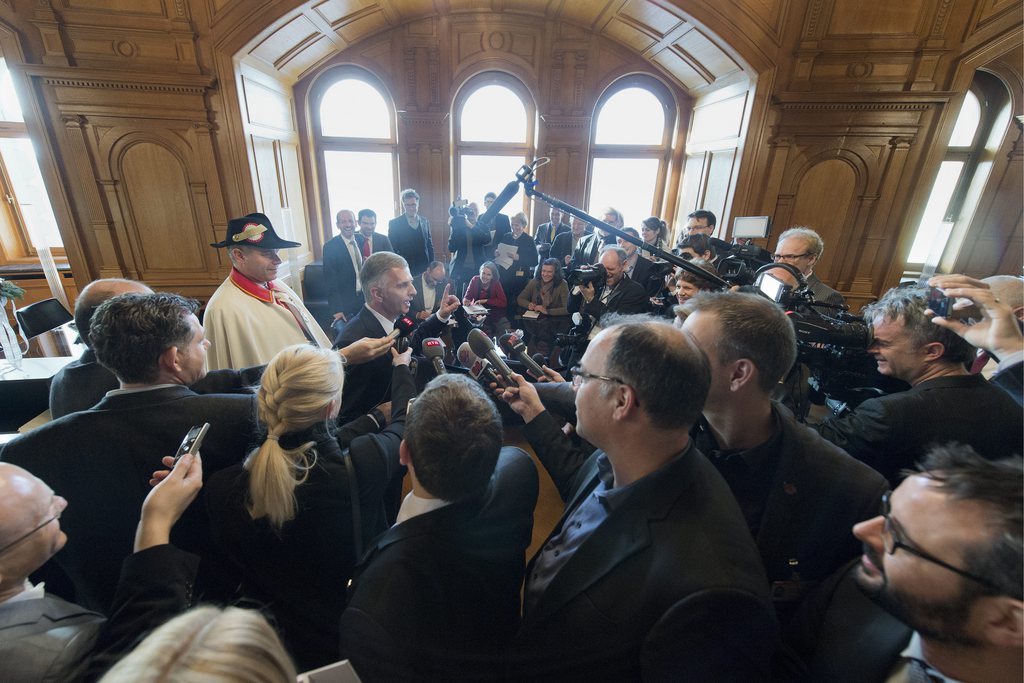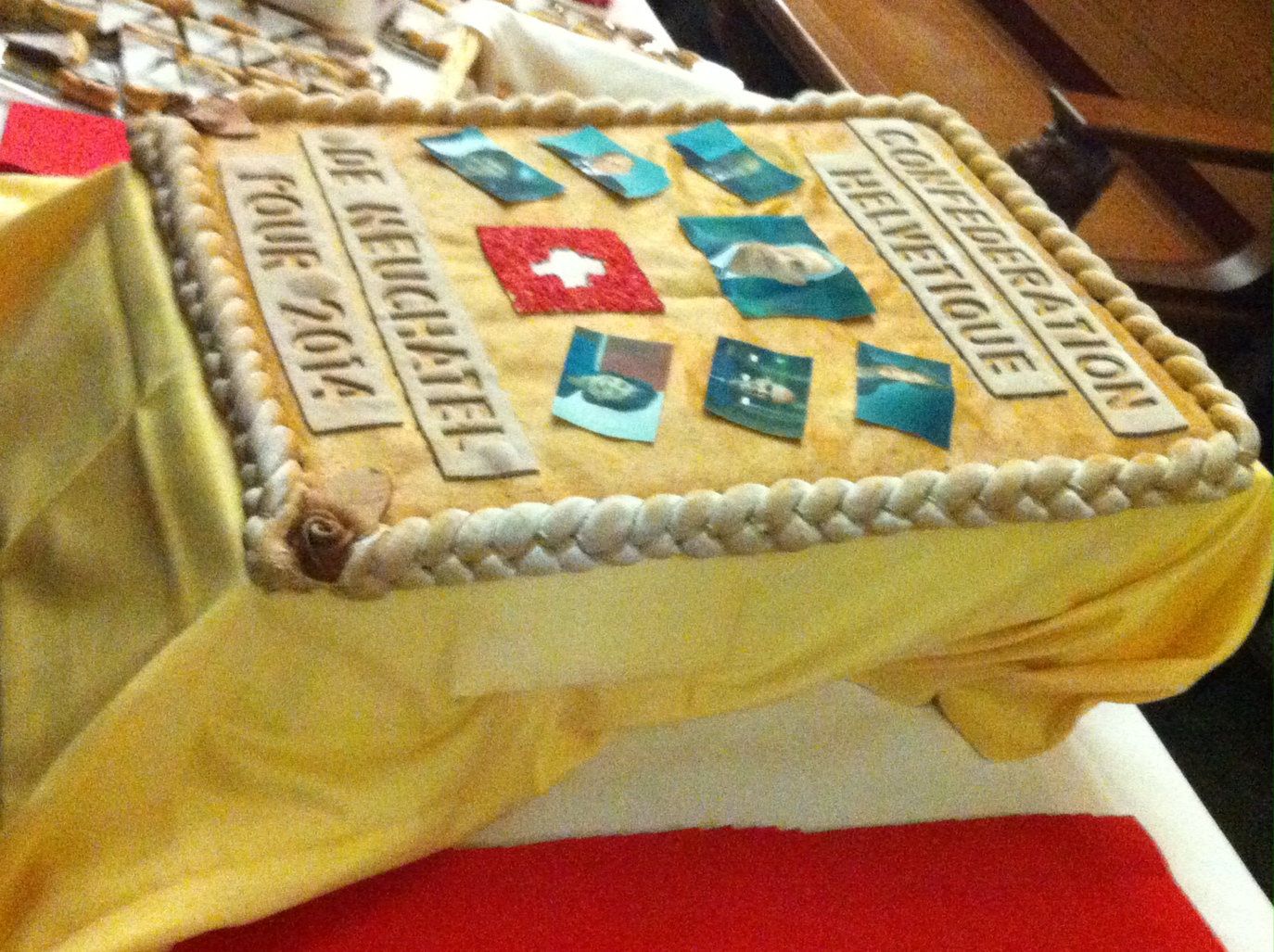Burkhalter elected president for 2014

Swiss Foreign Minister Didier Burkhalter will be the country’s president next year, after parliament accepted his nomination.
Burkhalter received 183 votes out 222 ballots cast by the parliamentarians. The 53-year-old centre-right Radical from canton Neuchâtel will take over from Defence Minister Ueli Maurer on January 1.
The Swiss presidency is held by a different member of the seven-person cabinet every calendar year. The choice is based on seniority in the government, which means that a minister becomes president at least once every seven years.
Burkhalter was elected in the first round of voting with a good score, one of the best over the past decade, a result greeted with traditional cheers by a joint session of the Senate and the House of Representatives. Maurer, for example, only received 148 votes last year.
Swiss Foreign Minister Didier Burkhalter was born in 1960 and grew up in the village of Auvernier in canton Neuchâtel. He is married and has three children.
In 1985, he joined centre-right Radical Party. During his earlier career, he served in different parliaments at all three levels of the Swiss political system: municipal, cantonal and federal.
He also served on a number of federal parliamentary commissions and was a member of the Swiss delegation to the Parliamentary Assembly of the Organization for Security and Co-operation in Europe (OSCE).
Burkhalter was elected to the government in 2009 where he took over the interior ministry. He has been in charge of the foreign ministry since January 2012.
Luzi Stamm, a parliamentarian from the rightwing Swiss People’s Party, told swissinfo.ch that there were few surprises in Burkhalter’s election.
“(Burkhalter) didn’t get quite as many votes as he maybe hoped for and as he got as vice-president, but I think that’s simply because 44 people were absent,” Stamm said, adding that many parliamentarians had arrived too late for the morning vote because of train delays and the early hour.
While the presidential election is traditionally a foregone conclusion, some parliamentarians express their displeasure with a candidate by casting a protest vote, leading to less impressive results.
“There have never been surprises in all the years I’ve been here, but it has happened that someone has been elected with very few votes, with 120 or 130, and that’s taken as a sign of mistrust,” Stamm told swissinfo.ch.
“I find it a bit out of place in this setting, even if I don’t agree with a president’s politics. This isn’t the moment to express a lack of confidence in the person being elected; it doesn’t matter to me how many votes they get.”
A day to remember – or forget
Andi Gross, a parliamentarian from the centre-left Social Democratic Party, says that over the past 50 years the outgoing vice-president has always been elected to the presidency for the next year. He agrees that the biggest surprise that comes on election day involves the number of votes the president gets, but that is soon forgotten.
“The normality of a president’s only slightly elevated position is reflected in the normality of the election day,” Gross says. “While the president-elect will certainly never forget that day, those who voted him in will barely remember it.”
And, he says, the vote outcome isn’t indicative of how well the president will perform in his or her position.
“There have been good presidents with bad vote results, and even more presidents with good vote results who didn’t necessarily bring quality to the post,” Gross says.
To him and to Stamm, the rotating presidency is an important part of Switzerland’s system of decentralised power and represents one of the country’s major strengths.
“Political power is very finely divided, every citizen has a piece of it, the parliamentarians a little more and the members of the cabinet still a bit more. But no one has so much that they can afford to stop learning,” said Gross.

Celebrations planned
Since Burkhalter hails from canton Neuchâtel, his election day was marked by a small celebration in the parliament building with food and drinks representing his native canton, people in traditional dress and visitors from his hometown coming to wish him well.
Though Burkhalter was not present during the vote, he appeared later with his family to partake in the reception and greet the media.
A larger celebration will take place next week, when Burkhalter will head home to Neuchâtel by train to be received by the public in grand fashion.
For Gross, this celebration is the most unusual part of the annual presidential election.
“Next week, a half day of the parliamentary session will be cancelled as a few politicians accompany the newly elected president on the trip to his home canton and help him celebrate with friends and family,” Gross said. “But this belongs to the winter parliamentary session just like ‘Schmutzli’ [Santa’s helper] belongs to Saint Nick.“

In compliance with the JTI standards
More: SWI swissinfo.ch certified by the Journalism Trust Initiative

You can find an overview of ongoing debates with our journalists here. Please join us!
If you want to start a conversation about a topic raised in this article or want to report factual errors, email us at english@swissinfo.ch.